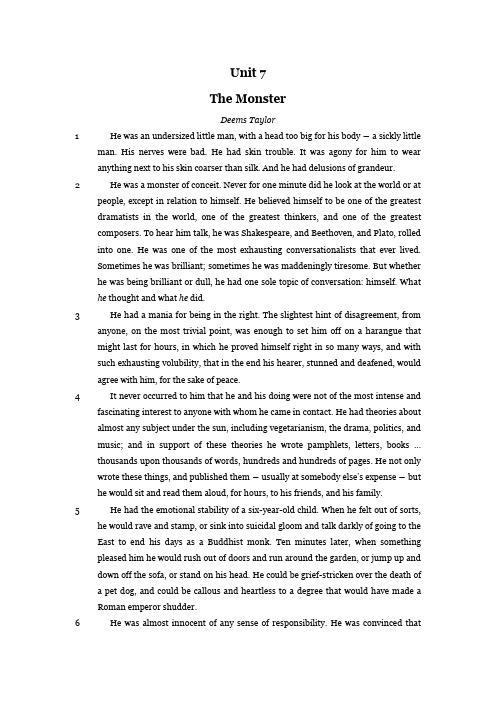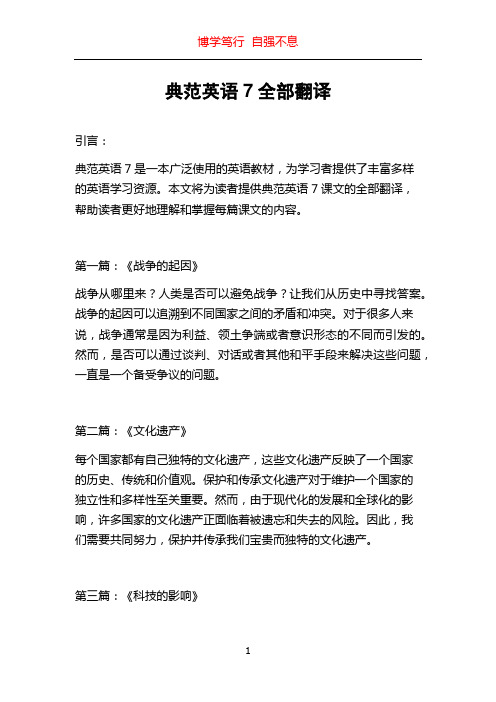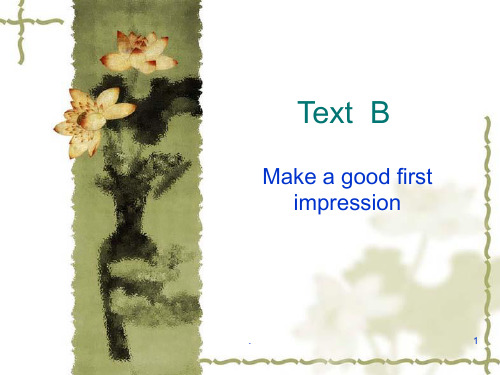英语本科段自学考试英汉翻译教程Unit 7 Literature.doc
(完整版)Unit7TheMonster课文翻译综合教程四

Unit 7The MonsterDeems Taylor1He was an undersized little man, with a head too big for his body ― a sickly little man. His nerves were bad. He had skin trouble. It was agony for him to wear anything next to his skin coarser than silk. And he had delusions of grandeur.2He was a monster of conceit. Never for one minute did he look at the world or at people, except in relation to himself. He believed himself to be one of the greatest dramatists in the world, one of the greatest thinkers, and one of the greatest composers. To hear him talk, he was Shakespeare, and Beethoven, and Plato, rolled into one. He was one of the most exhausting conversationalists that ever lived.Sometimes he was brilliant; sometimes he was maddeningly tiresome. But whether he was being brilliant or dull, he had one sole topic of conversation: himself. What he thought and what he did.3He had a mania for being in the right. The slightest hint of disagreement, from anyone, on the most trivial point, was enough to set him off on a harangue that might last for hours, in which he proved himself right in so many ways, and with such exhausting volubility, that in the end his hearer, stunned and deafened, would agree with him, for the sake of peace.4It never occurred to him that he and his doing were not of the most intense and fascinating interest to anyone with whom he came in contact. He had theories about almost any subject under the sun, including vegetarianism, the drama, politics, and music; and in support of these theories he wrote pamphlets, letters, books ...thousands upon thousands of words, hundreds and hundreds of pages. He not only wrote these things, and published them ― usually at somebody else’s expense ― but he would sit and read them aloud, for hours, to his friends, and his family.5He had the emotional stability of a six-year-old child. When he felt out of sorts, he would rave and stamp, or sink into suicidal gloom and talk darkly of going to the East to end his days as a Buddhist monk. Ten minutes later, when something pleased him he would rush out of doors and run around the garden, or jump up and down off the sofa, or stand on his head. He could be grief-stricken over the death ofa pet dog, and could be callous and heartless to a degree that would have made aRoman emperor shudder.6He was almost innocent of any sense of responsibility. He was convinced thatthe world owed him a living. In support of this belief, he borrowed money from everybody who was good for a loan ― men, women, friends, or strange rs. He wrote begging letters by the score, sometimes groveling without shame, at others loftily offering his intended benefactor the privilege of contributing to his support, and being mortally offended if the recipient declined the honor.7What money he could lay his hand on he spent like an Indian rajah. No one will ever know ― certainly he never knows ― how much money he owed. We do know that his greatest benefactor gave him $6,000 to pay the most pressing of his debts in one city, and a year later had to give him $16,000 to enable him to live in another city without being thrown into jail for debt.8He was equally unscrupulous in other ways. An endless procession of women marched through his life. His first wife spent twenty years enduring and forgiving his infidelities. His second wife had been the wife of his most devoted friend and admirer, from whom he stole her. And even while he was trying to persuade her to leave her first husband he was writing to a friend to inquire whether he could suggest some wealthy woman ― any wealthy woman ― whom he could marry for her money.9He had a genius for making enemies. He would insult a man who disagreed with him about the weather. He would pull endless wires in order to meet some man who admired his work and was able and anxious to be of use to him ― and would proceed to make a mortal enemy of him with some idiotic and wholly uncalled-for exhibition of arrogance and bad manners. A character in one of his operas was a caricature of one of the most powerful music critics of his day. Not content with burlesquing him, he invited the critic to his house and read him the libretto aloud in front of his friends.10The name of this monster was Richard Wagner. Everything I have said about him you can find on record ― in newspapers, in police reports, in the testimony of people who knew him, in his own letters, between the lines of his autobiography.And the curious thing about this record is that it doesn’t matter in the least.11Because this undersized, sickly, disagreeable, fascinating little man was right all the time, the joke was on us. He was one of the world’s greatest dramatists; he was a great thinker; he was one of the most stupendous musical geniuses that, up to now, the world has ever seen. The world did owe him a living. What if he did talk about himself all the time? If he talked about himself for twenty-four hours every day for the span of his life he would not have uttered half the number of words that othermen have spoken and written about him since his death.12When you consider what he wrote ― thirteen operas and music dramas, eleven of them still holding the stage, eight of them unquestionably worth ranking among the world’s great musico-dramatic masterpieces ― when you listen to what he wrote, the debts and heartaches that people had to endure from him don’t seem much of a price.13What if he was faithless to his friends and to his wives? He had one mistress to whom he was faithful to the day of his death: Music. Not for a single moment did he ever compromise with what he believed, with what he dreamed. There is not a line of his music that could have been conceived by a little mind. Even when he is dull, or downright bad, he is dull in the grand manner. Listening to his music, one does not forgive him for what he may or may not have been. It is not a matter of forgiveness. It is a matter of being dumb with wonder that his poor brain and body didn’t burst under the torment of the demon of creative energy that lived inside him, struggling, clawing, scratching to be released; tearing, shrieking at him to write the music that was in him. The miracle is that what he did in the little space of seventy years could have been done at all, even by a great genius. Is it any wonder he had no time to be a man?畸人迪姆斯·泰勒1 他是个大头小身体、病怏怏的矬子;成日神经兮兮,皮肤也有毛病。
典范英语7全部翻译

典范英语7全部翻译引言:典范英语7是一本广泛使用的英语教材,为学习者提供了丰富多样的英语学习资源。
本文将为读者提供典范英语7课文的全部翻译,帮助读者更好地理解和掌握每篇课文的内容。
第一篇:《战争的起因》战争从哪里来?人类是否可以避免战争?让我们从历史中寻找答案。
战争的起因可以追溯到不同国家之间的矛盾和冲突。
对于很多人来说,战争通常是因为利益、领土争端或者意识形态的不同而引发的。
然而,是否可以通过谈判、对话或者其他和平手段来解决这些问题,一直是一个备受争议的问题。
第二篇:《文化遗产》每个国家都有自己独特的文化遗产,这些文化遗产反映了一个国家的历史、传统和价值观。
保护和传承文化遗产对于维护一个国家的独立性和多样性至关重要。
然而,由于现代化的发展和全球化的影响,许多国家的文化遗产正面临着被遗忘和失去的风险。
因此,我们需要共同努力,保护并传承我们宝贵而独特的文化遗产。
第三篇:《科技的影响》科技的发展已经对我们的生活产生了深远的影响。
从早期的工业革命到今天的信息技术革命,科技不仅改变了我们的生活方式,还改变了我们与世界的互动方式。
然而,科技发展也带来了许多问题和挑战。
例如,人们越来越依赖科技,失去了与他人面对面交流的机会。
在利用科技的同时,我们也需要注意保持适度和平衡,以避免科技对我们生活的负面影响。
第四篇:《环境保护》环境保护是当今全球关注的焦点之一。
随着人口的增长和工业的发展,环境问题变得越来越严重。
气候变化、土地退化和水污染等问题已经对我们的生活产生了巨大的影响。
因此,保护环境变得至关重要。
我们需要采取一系列的举措,如减少碳排放、节约能源和推动可持续发展,以实现环境的保护和可持续发展。
第五篇:《健康生活》健康是我们生活中最重要的财富之一。
保持健康的生活方式对于我们的身心健康非常重要。
饮食健康、适度运动、充足的睡眠和压力管理都是保持健康的重要方面。
此外,我们还需要关注心理健康,保持积极乐观的心态。
通过保持健康的生活方式,我们可以更好地享受生活,并更好地应对生活中的各种挑战。
自考英语unit-7-TextBppt课件

❖ deep-depth-deepen 变深,加深
❖ strong-strength-strengthen(加强,巩固 )
❖ wide-width-widen 加宽;放宽
❖ broad-breadth-broaden加宽;放宽
❖ high-height-heighten(使)变高; (使)加强
❖ weak-weakness-weaken 削弱;减弱
❖ 5. Actions speak louder than words, and…
❖ 事实胜于雄辩; ❖ 行动胜于空谈; ❖ 行动比言语更有说服力; ❖ 百说不如一干。
.
15
❖ 6. Dr. Stephen K. Sproul, a veterinarian in Raytown, Missouri, told of a typical spring day when his waiting room was full of clients waiting to have their pets inoculated.
❖ as luck would have it 碰巧;真幸运;幸而
❖ more than a little distraught: very upset and anxious
.
17
❖ 8. The ancient Chinese were a wise lot wise in the ways of the world(人情世故);
❖ 5. Influenced by a famous psychologist, he
chooses to major in psychology.
.
24
Section B
❖ 1.also ❖ 2. As ❖ 3. In addition ❖ 4. For example ❖ 5. even if ❖ 6.finally
自考英语二-Unit 7 Your Inner Voice

课文翻译
我的一天又开始了,就像过去15年中的每一天一 样,起床,煮咖啡,沐浴,穿衣服,在7点35分 准时赶到火车站搭乘火车以便在8点30分之前到 达工作地点。在火车上,我总是选择远离人群的 座位以便我能平静地读报纸。工作中,我要无休 止地应对同事、供应商提出的各种问题,电话总 是响个不停,还有那些令人恐惧的会议,所以我 最不想做的事就是和坐在身边的陌生人闲聊。
massively大量地 17. address v. 写(收信人)姓名地址;致函 18. receptionist n. 接待员
reception n. 接待 19. attach v. 把…固定,把…附(在…上)
attach … to… attached 依恋的;附加的;附属的 attachment 依恋;附件 20. emotion n. 强烈的感情;情感;情绪
我的一天又开始了就像过去我的一天又开始了就像过去15年中的每一天一年中的每一天一样起床煮咖啡沐浴穿衣服在样起床煮咖啡沐浴穿衣服在7点点35分分准时赶到火车站搭乘火车以便在准时赶到火车站搭乘火车以便在8点点30分之前到分之前到达工作地点
Unit 7 Your Inner Voice
By: Tracy
New words
excited / exciting
amazed / amazing
disappointed / disappointing 注意:excited eyes / expressions / looks 24. scream v. 高声喊,大声叫
Phrases and Expressions
1. be lost in one's thought 陷入沉思 2. break down 失败 3. come up with 找到(答案等);想出 4. drop…off (顺路)把…放下 5. take one's own life 自杀 6. in desperation 在绝望中;走投无路 7. care about sb. 关心;关怀 8. take a chance 冒险 9. make a difference 有作用;产生影响
自考英语一unit7课件

Unit 7Text A Families搭配:1.descend from 从什么传下来的/动词词组2.think of…as… 把什么看作是/动词词组3.far away from 远离/副词词组4.feeling of belongings 归属感/名词词组5.with the change 随着变化/介词词组6.care for 照顾/动词词组7.split up 裂变,离婚/动词词组8.talk of 谈及/动词词组语言点:1.Having a family simply means having children. (前一个动词的ing形式放在means这个谓语动词前是动名词作主语;后一个动词ing形式放在means 这个谓语动词后是动名词作宾语)2.No matter+(if, whether, how, what, when, who, where, which等连词)+句子。
表示无论……3.Every family has a sense of what a family is.4.industry(n.工业)-industrial(adj.工业的)-industrialize(v.使工业化)5.increase(增长)这个动词经常用在进行时态中。
6.Most single parents find it very difficult to take care of a family alone,so they soon marry again and form remarried families.(形式宾语句型:主语+谓语+it+n./adj.+to do +其他)Text B The Changing American Family搭配:1.be important to sb. 对某人很重要/动词词组2.provide for 为谁提供什么/动词词组3.be expected to do sth. 应该做某事/动词词组4.take care of 照顾/动词词组5.work for pay 为了赚钱而工作/动词词组6.be (not) considered to be/do sth. 被认为是什么,做什么/动词词组7.make decisions about sth./doing sth. 做什么决定/动词词组8.working wife 工作的妻子/名词词组9.help sb. with sth. 帮助某人什么/动词词组10.in contrast 与此相反/副词词组11.get ready for 为什么做好准备/动词词组12.be busy with sth./be busy (in) doing sth. 忙于做某事/动词词组13.in conclusion 最后/副词词组14.bring changes to sb/sth…… 给某人带来了变化/动词词组语言点:1.similar(adj.相似的)-similarly(adv.相似地)——similarity(n.相似)2.may have done sth. 对过去发生的事情进行推断 e.g. She may have been married. 她有可能已经结婚了。
英汉翻译教程_张培基等

英语则是从综合型向分析型语言发展的语言。如英语book表示书的单数;books则表示书的复数。英语陈述句中现在时态单数第三人称(third person singular)要加s;或借助元音互换与辅音互换的方式表示复数,如foot(脚,单数),feet(脚,复数);或借助错根形式表示时态(tense),如go-went-gone等。再看下面几个句子:
汉语历史较英语历史长得很,汉语已有6000多年的历史了。汉字经历过许多变迁:甲骨文---金文---篆书---隶书---楷书:演变的总趋势是由繁到简,由单纯表意向部分表音方向发展。但汉语的特点没有变,它仍然是表意文字。汉语是世界上最发达的语言之一。《康熙字典》收了4.9万个字的汉字。《汉语大字典》收5.6万字。台湾1973年出版的《中文大辞典》收词40余万条。1960年出版的《大汉和辞典》收词55万余条。汉字的构词能力强。曾有人作了粗略的统计,汉语中单是表示手的动作的词就有200多个,单“一”字开头的成语,就有5472条。据称原计划出版的《中山大辞典》曾包括60余万条。
所谓“形合”就是主要靠语言本身语法手段。所谓“意合”主要靠句子内部逻辑联系。因此,英语结构紧凑严密;汉语结构简练明快。英语句子好比一棵参天大树,一串葡萄,一串珍珠,一树荔枝。而汉语句子
好比一根竹子,一盘珠子,一江波涛。
著名汉语学家王力教授说过:“西洋语法是硬的,没有弹性;中国语法是软的,富有弹性。……所以中国语法以达意为主。”英国人写文章往往化零为整,而中国人写文章往往化整为零。“
新编英语教程7课文翻译_(Unit_1-14_Text_I_译文)

Unit 1 英国人和美国人的空间概念人们说英国人和美国人是被同一种语言分离开的两个伟大的民族。
英美民族之间的差异使得英语本身受到很多指责,然而,这些差异也许不应该过分归咎于语言,而应该更多的归因于其他层面上的交流:从使很多美国人感到做作的英式语音语调到以自我为中心的处理时间、空间和物品的不同方法。
如果说这世上有两种文化间的空间关系学的具体容迥然不同,那就是在有教养(私立学校)的英国人和中产阶级的美国人之间了。
造成这种巨大差异的一个基本原因是在美国人们借助空间大小来对人或事加以分类,而在英国决定你身分的却是社会等级制度。
在美国,你的住址可以很好的暗示你的身分(这不仅适用于你的家庭住址,也适用于你的商业地址)。
住在纽波特和棕榈滩的人要比布鲁克林和迈阿密的人高贵时髦得多。
格林尼治和科德角与纽华克和迈阿密简直毫无类似之处。
座落在麦迪逊大道和花园大道的公司要比那些座落在第七大道和第八大道的公司更有情调。
街角办公室要比电梯旁或者长廊尽头的办公室更受尊敬。
而英国人是在社会等级制度下出生和成长的。
无论你在哪里看到他,他仍然是贵族,即便是在鱼贩摊位的柜台后面。
除了阶级差异,英国人和我们美国人在如何分配空间上也存在差异。
在美国长大的中产阶级美国人觉得自己有权拥有自己的房间,或者至少房间的一部分。
当我让我的美国研究对象画出自己理想的房间或办公室时,他们毫无例外的只画了自己的空间,而没有画其他人的地方。
当我要求他们画出他们现有的房间或办公室时,他们只画出他们共享房间里自己的那部分,然后在中间画一条分隔线。
无论是男性还是女性研究对象,都把厨房和主卧划归母亲或妻子的名下,而父亲的领地则是书房或休息室,如果有的话;要不然就是工场,地下室,或者有时仅仅是一工作台或者是车库。
美国女性如果想独处,可以走进卧室、关上门。
关闭的门是“不要打扰”或“我很生气”的标志。
如果一个美国人家里或办公室的房门是开着的,则说明他现在有空。
在这样的暗示下,人们不会认为他想把自己关闭起来,而会认为他正处于一种随时响应他人的准备就绪的状态中。
英汉汉英口译基础教程Unit 7 Cultural Exchange

A. Individual Work: Presentation
Topic: Russia Arts (movies, novels, music, etc.) that I Know.
Brainstorming clues: Year of Russia, Red
E. Group Work: Sight Interpretation
Text Two Difficult Sentences
自从中国加入世贸组织以后,国内盗版问题便日渐凸现。 After China’s entry into the WTO, the problem of piracy in China
D. Pair Work: Note-taking and Interpretation
Text two Note-taking
“一个世界文化遗址真正的文化和历史价 值不应该由网友投票来决定,而应由它 对人类的意义来决定。”
他对主办方和为长城投票的人们所做出 的努力表示了感谢。同时,他还欢迎世 界各地的朋友来长城亲自感受它的“不 朽与伟大”。
该活动以“传承民族文化、沟通人类文明、共建和谐世 界”为主题,目的是为了加强中国在保护非物质文化遗 产方面的努力以及在此领域增强中国的国际影响力。
E. Group Work: Sight Interpretation
Text One Difficult Sentences There was also a two-day Chengdu
D. Pair Work: Note-taking and Interpretation
Text two Note-taking 今年1月,瑞士一个民间基金会发起了一项面
- 1、下载文档前请自行甄别文档内容的完整性,平台不提供额外的编辑、内容补充、找答案等附加服务。
- 2、"仅部分预览"的文档,不可在线预览部分如存在完整性等问题,可反馈申请退款(可完整预览的文档不适用该条件!)。
- 3、如文档侵犯您的权益,请联系客服反馈,我们会尽快为您处理(人工客服工作时间:9:00-18:30)。
Unit 7 Literature (2)Lesson 19(E—C)East of Eden(1)By John SteinbeckThe Salinas Valley is in Northern California. It is a long narrow swale betwwen two ranges of mountains, and the Salinas River winds and twists up the center until it falls at last into Monterey Bay.I remember my childhood names for grasses and secret flowers. I remember where a toad may live and what time the irds awaken in the summer—and what trees and seasons smelled like—how people looked and walked and smelled even. The memory of odors is very rich.I remember that the Gabilan Mountains to the east of the valley were light gay mountains full of sun and loveliness and a kind of invitation, so that you wanted to climb into their warm foothills almost as you want to climb into the lap of a beloved mother. They were beckoning mountains with a brown grass love. The Santa Lucias stood up against the sky to the west and kept the valley from the open sea, and they were dark and brooding—unfriendly and dangerous. I always found in myself a dread of west and a love of east. Where I ever got such an idea I cannot say, unless it could be that the morning came over the peaks of the Gabilans and the night drifted back from the ridges of the Santa Lucias. It may be that the birth and death of the day had some part in my feeling about the two ranges of mountains.From both sides of the valley little streams slpipped out of the hill canyons and fell into the bed of the Salinas River. In the winte of wet years the streams ran full-freshet, and they swelled the river until sometimes it raged and boiled, bank full, and then it was a destroyer. The river tore the edges of the farm lands and washed whole acres down; it toppled barns and houses into itself, to go floating and bobbing away. It trapped cows and pigs and sheep and drowned them in its muddy brown water and carried them to the sea. Then when the late spring came, the river drew in from its edges and the sand banks appeared. And in the summer the river didn’t run at all above ground. Some pools would be left in the deep swirl places under a high bank. The tules and grasses grew back, and willows straightened up with the flood debris in their upper branches. The Salinas was only a part-time river. The summer sun drove it underground. It was not a fine river at all, but it was the only one we had and so we boasted about it—how dangerous it was in a wet winter and how dry it was in a dry summer. You can boast about anything if it’s all you have. Maybe the less you have, the more you are required to boast.(from John Steinbeck, East of Eden, Chapter1)译文:萨利内斯河谷位于加利福民亚州北部。
那是两条山脉之间的一片狭长的洼地,萨利内斯河蜿蜒曲折从中间流过,最后注入蒙特雷海湾。
我记得儿时给各种小草和隐蔽的小花取的名字。
我记得蛤蟆喜欢在什么地方栖身,鸟雀夏天早晨什么时候醒来——我还记得树木和不同季节特有的气息——记得人们的容貌、走路的姿势、甚至身上的气味。
关于气味的记忆实在太多啦。
我记得河谷东面的加毕仑山脉总是阳光璀璨、明媚可爱,仿佛向你殷勤邀请,你不禁想爬上暖洋洋的山麓小丘,正像爬到亲爱的母亲怀里那样。
棕色的草坡给你爱抚,向你召唤。
西面的圣卢西亚斯山脉高耸入云,黑压压地挡在河谷和大海之间,显得不友好而危险。
我发现自己一直对西方怀有畏惧,而对东方怀有喜爱。
我说不出这种想法的根子在什么地方,也许是因为黎明从加比仑山顶升起,夜晚从圣卢西亚斯山脊压下来。
每一天的诞生和消亡也许使我对两条山脉产生了不同的感情。
洼地两面的小峡谷都有涧水流出,汇入萨利纳斯河床。
在多雨的年份,冬天水流充沛,引起河面暴涨,有时候汹涌翻腾,泛滥两岸,就成了祸害。
河水冲坏农田边级,毁掉大片大片的土地,使牲口棚和房屋坍塌,卷入洪流,漂浮而去。
牛、猪、羊走投无路,在黄褐色的泥水里眼睁睁地淹死,给带到海里。
春末时分,河面变窄,露出了沙岸。
到了夏天,地上河水完全断流。
只有原先岸高漩涡深的地方才留下几个水塘。
芦苇和茅草重新生长,柳树直起躯干,上部的枝桠还挂着洪水留下的枯枝败草。
它根本不是条了不起的河流,但是我们只有这么一条,因此便为它吹嘘。
如果你别无他有,你可以为任何东西吹嘘。
也许你有的东西越少,你就越要吹吹牛皮。
(选自王仲年译《伊甸之东》)Lesson 20 (E—C)The Sund of Music(Ecerpt 1)By Maria Augusta TrappSuddenly I heard quick footsteps behind me, and a full, resonant voice exchaimed: “I see you are looking at my flag.”There he was—the Captain!The tall, well-dressed gentleman standing before me was certainly a far cay from the old sea wolf of my imagination. His air of complete self-assurance and somewhat lordly bearing would have frightened me, had it not been for his warm and hearty hadndshake.“I am so glad you have come, Fraulein…”I filled in, “maria.”He took me in from topp to toe with a quick glance. All of a sudden I became very conscious of my funny dress, and sure enough, there I was diving under my helmet again. But the Captain’s eyes rested on my shoes.We were still standing in the hall when he said: “I want you to meet the children first of all.”Out of his pocket he took an odd-shaped, ornamented brass whistle, on which he piped a series of complicated trills.I must have looked highly amazed, because he said, a little apologeticall: “You see it taks so long to call so many children by name, that I’ve given them each a different whistle.”Of course, I now expected to hear a loud banging of doors and a chorus of giggles and shouts, the scampering feet of youngsters jumping down the steps and sliding down the banister. In stead, led by a sober-faced young girl in her arly teens, an almost solemn little procession descended step by step in well-mannered silence—four girls and two boys, all dressed in sailor suits. For and instant we stared at each other in utter amazement. I had never seen such perfect little ladies and gentlemen, and they had never seen such a helmet.“Here is our new teacher, Fraulein Maria.”“Gruss Gott, Fraulein Maria,” six voices echoed in unison. Six perfect bows followed.That wasn’t real. That couldn’t be true. I had to shove back that ridiculosu hat again. This push, bowerer, was the last. Down came the ugly brown thing, rolled on the shiny parquet floor,and landed at the tiny feet of a very pretty, plump little girl of about five. A delingted giggle cut through the severe silence. The ice was broken. We all laughed.(from Maria Augusta Trapp, The Sound of Music)参考译文:音乐之声(摘录1)玛丽亚·奥古斯塔·特拉普我突然听见身后有急促的脚步声,接着就听见一个非常宏亮的声音说道:“看来您是在看我的旗子哪!”这个人,就是舰长。
